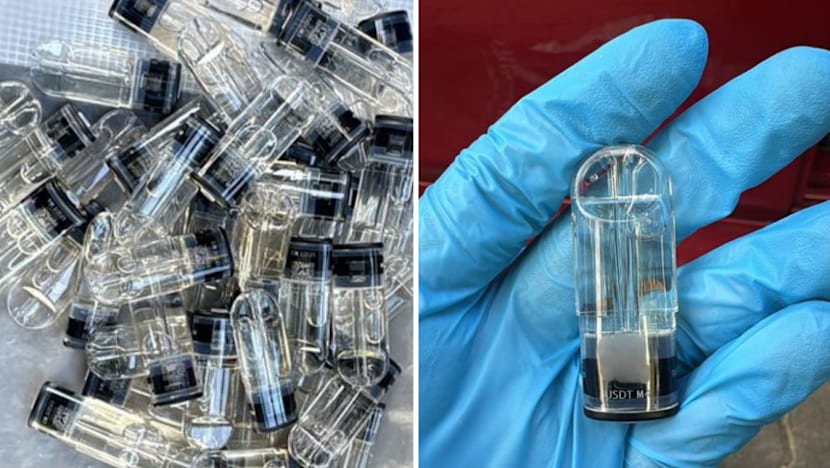5,000 officers deployed to enforce Singapore vaping laws, nearly double previous force
A total of 232 people have been fined for vaping-related offences since enhanced laws were introduced on Sep 1. Among the offenders, 32 were suspected of using Kpods.

E-vaporisers and related components are found in an alleged trafficker’s vehicle on Sep 6, 2025. (Photos: Health Sciences Authority)

This audio is generated by an AI tool.
SINGAPORE: More than 5,000 frontline enforcement officers have been authorised to enforce vaping rules, said the Ministry of Health (MOH) and Health Sciences Authority (HSA) said on Monday (Sep 9).
The additional officers - from the Central Narcotics Bureau, Corrupt Practices Investigation Bureau, Land Transport Authority, Ministry of Manpower, Singapore Civil Defence Force, Singapore Prison Service and public transport operators - were recently authorised by HSA to act against e-vaporiser users.
This represents nearly a doubling of the existing enforcement force comprising officers from HSA, Immigration & Checkpoints Authority, Ministry of Education, National Environment Agency, National Parks Board, Singapore Customs and Singapore Police Force.
“The strengthened enforcement measures are part of the government's comprehensive response against vaping and the use of e-vaporisers containing harmful substances such as etomidate,” said MOH and HSA.
Harsher penalties for vaping offences came into force on Sep 1, with etomidate - the anaesthetic agent that has been found in vapes - listed as a Class C drug under the Misuse of Drugs Act.
Since then, 232 people have been caught for offences related to e-vaporisers, with at least 14 of them confirmed to be in possession of vapes laced with etomidate, or Kpods, said MOH and HSA.
All 232 individuals were fined on the spot.
In line with the enhanced enforcement regime, etomidate abusers are required to attend rehabilitation in lieu of prosecution.
“Three offenders who have undergone investigation have been served notices to attend rehabilitation for up to six months,” said MOH and HSA.
“They will undergo programmes that focus on education, counselling, and support to help individuals overcome their addiction.”
Those who do not complete the rehabilitation programme will be prosecuted, while offenders caught using vapes for the third time and more will be prosecuted in court under the Tobacco (Control of Advertisements and Sale) Act 1993 and be liable for a fine of up to S$2,000.
Monday’s announcement came on the same day a man was charged with possessing Kpods for the purpose of trafficking, the first such case after the new drug law came into effect on Sep 1.
Derek Khor Boon Chun, a 40-year-old Singaporean, was given one charge under the Misuse of Drugs Act for trafficking in a Class C controlled drug.
Khor was found on Sep 6 with around 50 e-vaporisers in his car and related components, including pods, which were later found to contain etomidate.
Under the enhanced penalties, those found guilty of importing etomidate e-vaporisers could face three to 20 years’ imprisonment and five to 15 strokes of the cane for importers.
Those found guilty of selling or distributing could face 2 to 10 years’ imprisonment and 2 to 5 strokes of the cane.
In the lead-up to the new laws, about 6,000 e-vaporisers and components were voluntarily discarded under the five-week “Bin the Vape” initiative, the authorities said.
The collection bins, placed at community clubs and institutes of higher learning, were removed on Aug 31, but designated disposal points will continue to be available at selected locations such as border checkpoints, the Health Promotion Board, Institute of Mental Health and participating social service agencies.


















